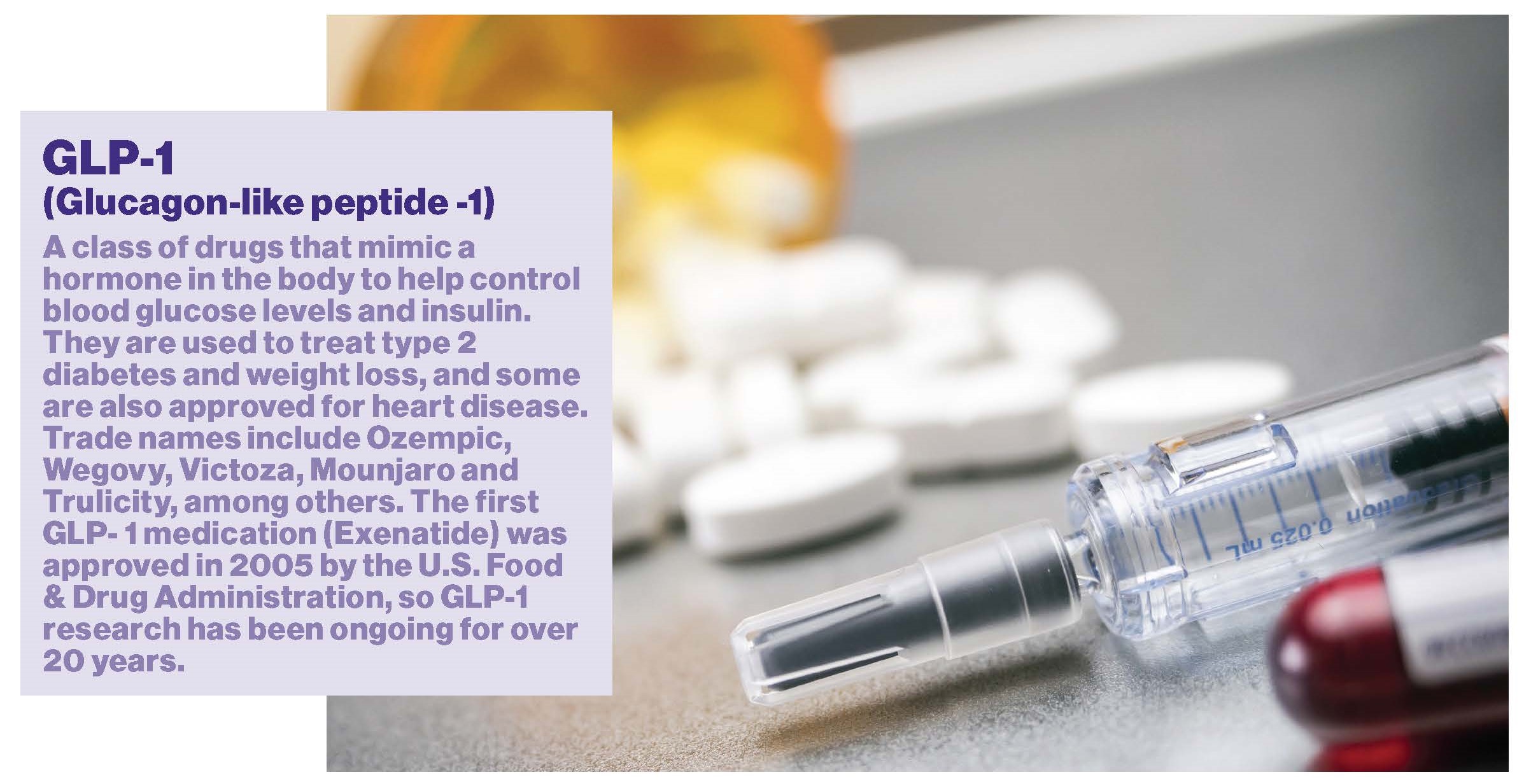The Power of Discovery: GLP-1 Receptor Agonists
November 11, 2025 · Baton Rouge, LA
For years, Pennington Biomedical Research Center has been instrumental in GLP-1 drug research
Life-changing medications don’t happen overnight. For years, Pennington Biomedical Research Center has been instrumental in GLP-1 drug research, ensuring that these treatments are not only effective but also safe for people across the globe. Today, GLP-1 drugs give millions of people new hope in their weight-loss journey, helping them achieve healthier lives and better long-term outcomes. But there’s still more to learn, and our scientists are already hard at work on the next generation of treatments.
LSU Boyd Professor Dr. Steven Heymsfield of Pennington Biomedical has had a distinguished career in obesity research and drug development. He has played a pivotal role in advancing treatments that target one of the most pressing public health challenges of our time. With a background that includes significant work at a pharmaceutical company developing obesity drugs, the trajectory of Dr. Heymsfield’s research experience ultimately led him to Pennington Biomedical, where he continues his extensive research.
As Director of the Metabolism & Body Composition Laboratory, one of Dr. Heymsfield’s key contributions is his involvement in the discovery and development of GLP-1 receptor agonists, a class of drugs that have become a major breakthrough in obesity treatment.
The origins of GLP-1 drugs trace back to a fascinating source – a compound found in the saliva of the Gila monster, a venomous lizard native to the American Southwest. This compound, known as exenatide, mimics the effects of GLP-1, a hormone that plays a critical role in appetite suppression, insulin secretion and glucose metabolism.
 GLP-1 (Glucagon-like peptide -1) are a class of drugs that mimic a hormone in the
body to help control blood glucose levels and insulin. They are used to treat type
2 diabetes and weight loss, and some are also approved for heart disease. Trade names
include Ozempic, Wegovy, Victoza, Mounjaro and Trulicity, among others. The first
GLP- 1 medication (Exenatide) was approved in 2005 by the U.S. Food & Drug Administration,
so GLP-1 research has been ongoing for over 20 years.
GLP-1 (Glucagon-like peptide -1) are a class of drugs that mimic a hormone in the
body to help control blood glucose levels and insulin. They are used to treat type
2 diabetes and weight loss, and some are also approved for heart disease. Trade names
include Ozempic, Wegovy, Victoza, Mounjaro and Trulicity, among others. The first
GLP- 1 medication (Exenatide) was approved in 2005 by the U.S. Food & Drug Administration,
so GLP-1 research has been ongoing for over 20 years.
“The application of these drugs in millions of people who are overweight and obese and leading them to lose weight is a remarkable observation,” he said. “I’ve worked in the field for many years, and this is the first time we’ve seen a drug that’s not only very effective but is safe even in children and adolescents with severe obesity.”
At Pennington Biomedical, Dr. Heymsfield emphasizes the importance of long-term, rigorous research in developing safe and effective treatments.
He noted that it can take 10 or more years to develop a new drug – and often drugs fail. Phase 3 clinical trials, which test new treatments in larger groups of people, are particularly crucial in ensuring that a drug works as intended and has minimal side effects.
The impact of GLP-1 drugs on public health has already been profound. With the obesity epidemic contributing to rising rates of diabetes, heart disease and other chronic conditions, GLP-1 therapies represent a potential turning point in the fight against these diseases. Dr. Heymsfield is especially hopeful that these drugs can help prevent type 2 diabetes, offering a proactive approach to metabolic health.
“GLP-1s will have a major impact on public health over the years to come,” Heymsfield said. “They can improve weight loss and health and reduce mortality. We’re excited about the many new applications of these drugs.”
For more information contact:
Joe Coussan, Media Relations Manager, joe.coussan@pbrc.edu, 225-763-3049 or Ernie Ballard, Senior Director of Communications & Marketing, ernie.ballard@pbrc.edu, 225-263-2677.
About the Pennington Biomedical Research Center
The Pennington Biomedical Research Center is at the forefront of medical discovery as it relates to understanding the triggers of obesity, diabetes, cardiovascular disease, cancer and dementia. Pennington Biomedical has the vision to lead the world in promoting nutrition and metabolic health and eliminating metabolic disease through scientific discoveries that create solutions from cells to society. The Center conducts basic, clinical and population research, and is a campus in the LSU System.
The research enterprise at Pennington Biomedical includes over 600 employees within a network of 44 clinics and research laboratories, and 16 highly specialized core service facilities. Its scientists and physician/scientists are supported by research trainees, lab technicians, nurses, dietitians and other support personnel. Pennington Biomedical is a globally recognized state-of-the-art research institution in Baton Rouge, Louisiana. For more information, see www.pbrc.edu.
Pennington Biomedical Research Center
6400 Perkins Road
Baton Rouge, LA 70808



